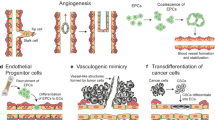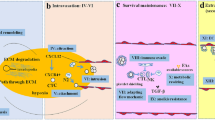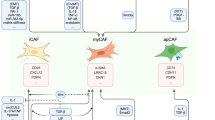Abstract:
Metastasis is the most life-threatening event in patients with cancer, with the liver being one of the most frequently affected organs. In the development and establishment of metastasis, blood-borne cancer cells utilise various cell adhesion mechanisms (cell-cell, cell matrix, tumour-endothelial and hepatocyte). Thus, cell adhesion molecules have a pivotal role in this process of metastasis formation. This article discusses recent progress in the biology of cell adhesion molecules in the formation of liver metastasis and the clinical implications of the findings.
Similar content being viewed by others
Author information
Authors and Affiliations
Additional information
Received for publication on Jan. 6, 1998; accepted on June 20, 1998
About this article
Cite this article
Jiang, W. Cell adhesion molecules in the formation of liver metastasis. J Hep Bil Pancr Surg 5, 375–382 (1998). https://doi.org/10.1007/s005340050061
Issue Date:
DOI: https://doi.org/10.1007/s005340050061




